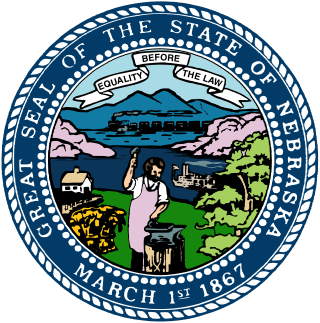Top Qs
Timeline
Chat
Perspective
1896 Nebraska lieutenant gubernatorial election
From Wikipedia, the free encyclopedia
Remove ads
The 1896 Nebraska lieutenant gubernatorial election was held on November 3, 1896, and featured Populist and Democratic fusion nominee James E. Harris defeating his major rival, Republican nominee Orlando Tefft.[1] Other candidates who received two percent of the vote or less included Gold Democratic nominee Owen F. Biglin, Prohibition nominee Lucius O. Jones, Socialist Labor nominee Fred Herman, and National Silver nominee Oscar Kent.[1] Incumbent Nebraska Lieutenant Governor Robert E. Moore did not seek reelection.
With the victory of Populist/Democratic fusion candidate James E. Harris, this election became the first Nebraska lieutenant gubernatorial election in which a candidate affiliated with a party other than the Republican Party won the office of lieutenant governor. The success of the Populist/Democratic fusion candidates was helped in part by the popularity of William Jennings Bryan, a Nebraskan running for president on the Populist/Democratic ticket.
Remove ads
General election
Candidates
- Owen F. Biglin, Nebraska Gold Democratic candidate, former candidate for Holt County Treasurer from O'Neill, Nebraska[2][3][4]
- James E. Harris, Populist/Democratic fusion candidate, farmer, preacher, and former member of the Nebraska Senate from 1893 to 1895 from Talmage, Nebraska[5][6][7]
- Fred Herman, Socialist Labor Party candidate from Lincoln, Nebraska[2]
- Lucius Orville Jones, Prohibition Party candidate, businessman, banker, and prominent member of the Methodist church from Lincoln, Nebraska[2][8][9]
- Oscar Kent, National Silver Party candidate, from Kenesaw, Nebraska[2][10]
- Orlando Tefft, Republican candidate, businessman, banker, and member of the Nebraska Senate since 1893 and previously from 1879 to 1883 from Avoca, Nebraska[5][11][12]
Results
Remove ads
See also
References
Wikiwand - on
Seamless Wikipedia browsing. On steroids.
Remove ads


